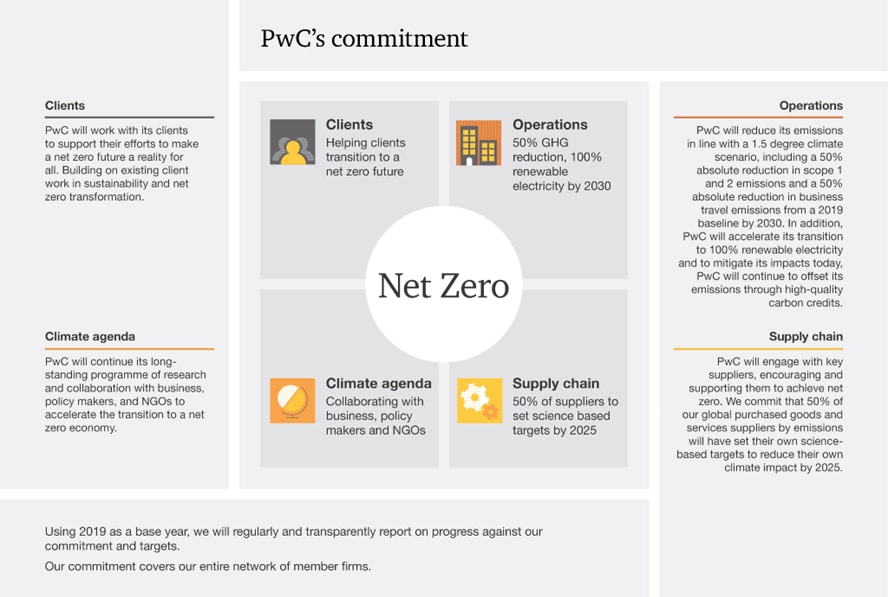Climate change is one of the most pressing problems facing our world today, affecting everyone, young and old, and everything, from what we eat to how we do business. As a small archipelago situated in the middle of the Mediterranean Sea, Malta’s unique geography poses several significant challenges. Scarce natural resources force heavy reliance on imports, while over-tourism and an ever-increasing population strains ecosystems and culture. Challenges related to waste management, water scarcity, and traffic congestion pose further environmental threats, making climate change vulnerabilities, biodiversity preservation and a shift away from fossil fuels matters of urgent concern.
At PwC, we believe the business community has a key role to play in making that happen. We’re determined to play our part, which is why we have made a worldwide commitment to achieve net zero greenhouse gas (GHG) emissions with near-term science-based targets set for 2030. Locally here in Malta, our dedication to achieving net zero remains unwavering. Over the past year, we have continued to advance our local net zero action plan by eliminating, reducing, substituting, and compensating for our carbon emissions through the purchase of high-quality carbon credits.

How will we achieve this?
Reducing emissions
Across our network, we commit to reducing our total greenhouse gas emissions by 50% in absolute terms by 2030. This includes investing in renewable energy sources in all territories, as well as energy efficiency improvements in our offices, and halving the emissions associated with business travel and accommodation within a decade. The COVID-19 pandemic has accelerated the shift to remote working and demonstrated the feasibility of new client delivery models, part of a longer-term transformation of our services.
Carbon removal projects
We will invest in carbon removal projects, including natural climate solutions. For every remaining tonne of CO2 equivalent that we emit, we will remove a tonne of carbon dioxide from the atmosphere to achieve net zero climate impact by 2030. Our projects will be selected based on quality criteria and verification of the carbon reduction impact and will also support broader local economic and social development co-benefits.
Progress so far
Our organisational boundary
In line with the operational control approach, any organisation that trades under the PwC brand or is operationally controlled by an organisation that trades under the PwC brand, shall be included within the organisational boundary. This covers PwC Malta and all its subsidiaries, including the PwC Academy.
Scope 1 & 2 emissions
Scope 1 emissions refer to direct GHG emissions from the consumption of fuel. In our case, this refers to the emissions from three ICE vehicles that are used as part of our daily operations.
Scope 2 emissions refer to indirect GHG emissions from the consumption of purchased electricity and make up a significant portion of our total footprint. In FY23, scope 2 emissions represented 48% of our total Scope 1, Scope 2, and Scope 3 Business Travel emissions.

To mitigate these emissions, we have implemented several initiatives. In FY22, we upgraded old HVAC systems and installed more energy-efficient heating and cooling equipment. In early 2023, we introduced temperature limits on all AC units. Smart controls through a new building management system and infrared films on windows have further reduced energy waste. We have transitioned to LED lighting and installed photovoltaic panels on our car park roof, supplying renewable energy for our operations.
Despite our recent office expansion and increased headcount, we achieved a 25% reduction in total Scope 1 and Scope 2 emissions from our FY19 baseline. This progress demonstrates our commitment to sustainability, bringing us halfway to our goal of a 50% reduction by 2030. We will need to continue to pursue initiatives that enhance energy efficiency and reduce our carbon footprint as we progress to 2030.
Scope 3 emissions
Our scope 3 emissions relate to emissions from purchased goods and services (category 1) and business travel (category 6). Addressing Scope 3 emissions, particularly from business travel, is our main point of focus given Malta's reliance on air travel. These emissions accounted for 52% of our total Scope 1, Scope 2, and Scope 3 Business Travel emissions in FY23, including emissions from air travel, land-based travel, and overnight accommodation.
In FY23, we saw a 6% decrease in business travel emissions from FY22, achieving a 12% reduction from our FY19 baseline. This progress was made despite increased travel post COVID-19. Here we are optimising travel practices, increasing virtual meetings, and encouraging sustainable travel options where feasible.
Decarbonising our supply chain is also a priority but a struggle. While only 2.5% of our purchased goods and services emissions in FY23 were from suppliers with science-based targets (SBTs), we are committed to engaging with suppliers to adopt SBTs. By FY25, PwC globally aims for 50% of suppliers by emissions to set SBTs.
Offsetting emissions
We have committed to purchasing high-quality carbon credits, transitioning our carbon credit portfolio to 100% carbon removals by FY30. PwC Malta has successfully offset 555 tonnes of CO2e for FY23, equivalent to all our Scope 1, Scope 2, and Scope 3 business travel emissions.
Client support and advocacy
The years to 2030 will be the most crucial years for climate action, making client support and advocacy central to our net zero commitment. As the leading professional services firm, we have a huge opportunity to accelerate the transition to a net zero future together. Today more than ever, our clients need to manage sustainability risks and opportunities within organisations and across value chains, and communicate and build trust by understanding, managing, and reporting social and environmental impacts.
PwC supports reform that puts the needs of stakeholders at the heart of the market economy and connects goals, actions, and outcomes into desired social and economic results that fuel long-term sustainability. Supporting the net zero transition is a key part of this process. We are deeply supportive of global efforts to develop transparent and robust ESG reporting frameworks and standards, including through work with the World Economic Forum International Business Council, the Financial Stability Board’s Task Force on Climate-related Financial Disclosures (TCFD), the Global Reporting Initiative (GRI), and the Sustainability Accounting Standards Board (SASB), among others.
CDP
One of the ways in which we disclose PwC’s environmental performance is through CDP, a not-for-profit charity that runs a global disclosure system for investors, companies, cities, states and regions to manage their environmental impacts. Disclosure drives action and CDP scores companies from D- to A, by taking them on a journey from disclosure through awareness and management, and finally to leadership.
We are proud to announce that we achieved an A- for our 2023 CDP submission, meaning we have achieved leadership status.
Climate change physical risk assessment
While net zero addresses our business’s impacts on the environment, the Task Force on Climate-related Financial Disclosures (TCFD) addresses how we are tackling the impacts of climate change on our business and addressing the risk that climate change brings.
As a result, we have undertaken a climate change physical risk assessment focusing on the direct impacts affecting PwC Malta’s operations, services, or people. While most climate hazards fall below the threshold for significant impact, drought stands out as both a current (2020) and future (2050) concern. We are identifying and developing plans for business responses needed to mitigate or adapt to the direct physical impacts identified.
Contact us
















